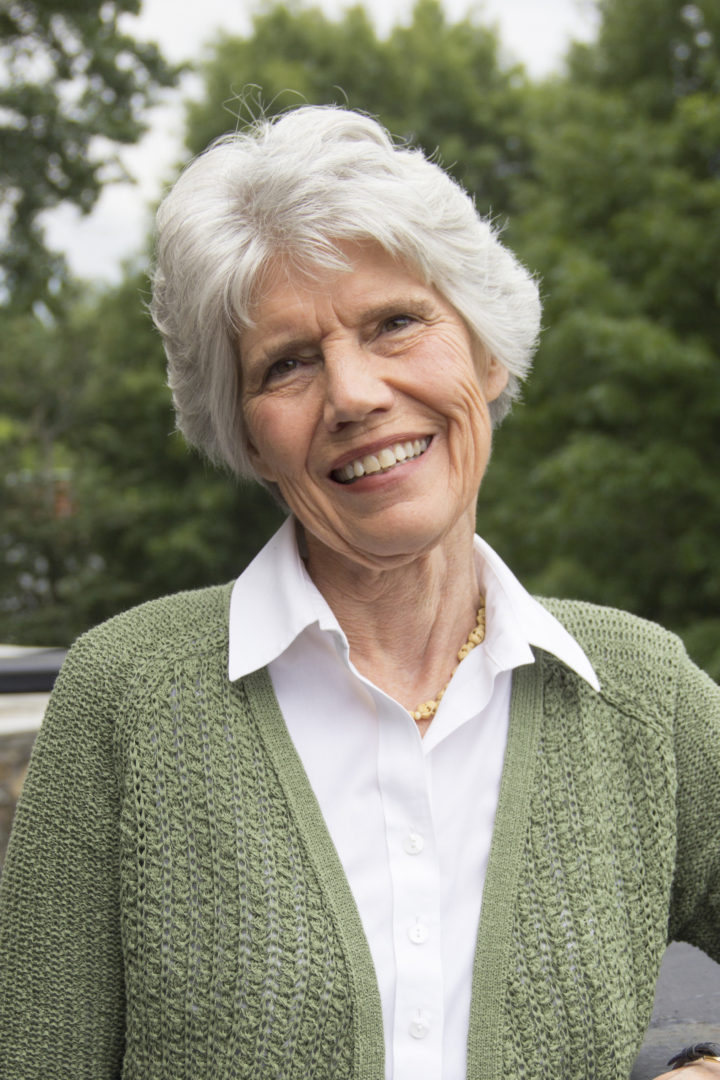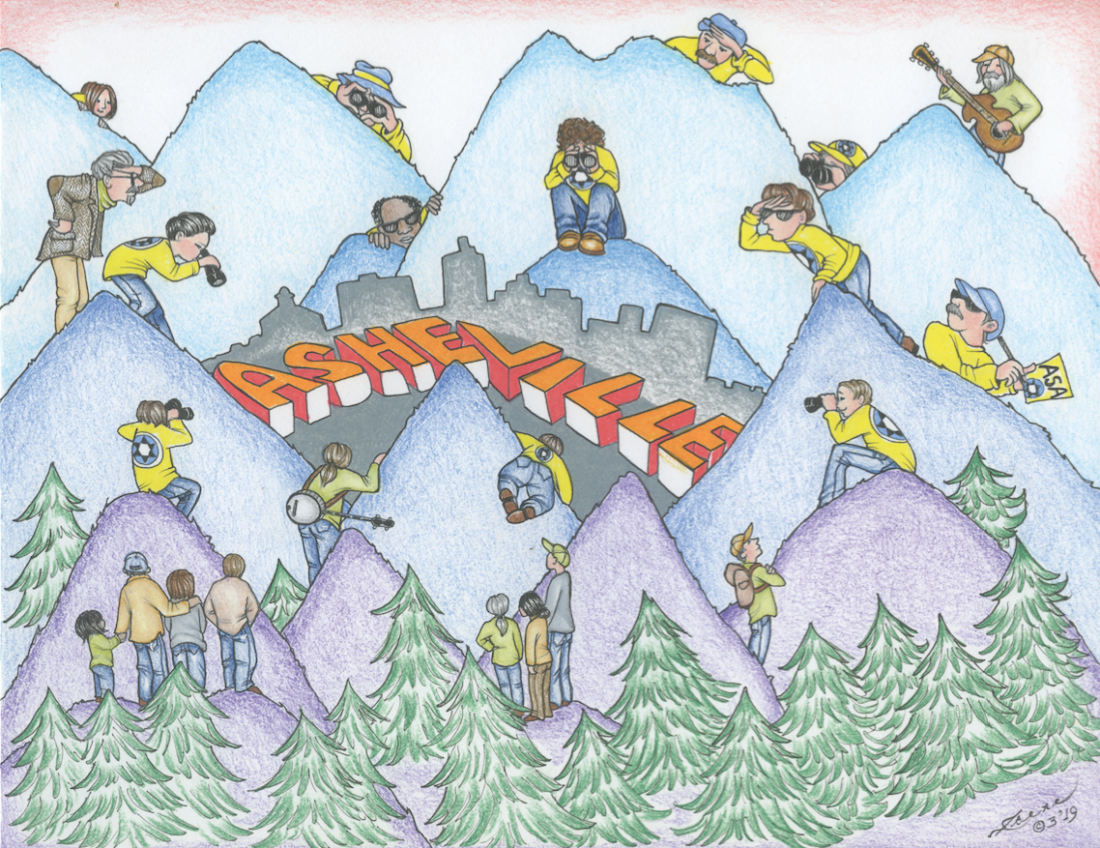UNC Asheville professor Dan Pierce holds many titles, including historian, scholar and author. But there’s one nickname the recipient of the Western North Carolina Historical Association’s 2017 Outstanding Achievement Award can’t quite shake: resident professional hillbilly.
“I’ve kind of embraced it,” says Pierce, whose friend Michael McFee, a poet and fellow Asheville native, bestowed the moniker on him years ago.
More recently, the historian, whose research interests range from NASCAR history to regional environmentalism, added yet another credit to his register: local arrangements chair for the 2019 Appalachian Studies Association conference. Now in its 42nd year, the annual gathering brings together an eclectic mix of scholars, educators, activists, students, groups and institutions to discuss and present on a wide range of topics related to life in the region.
This year’s happening, dubbed AppalachA’ville: Engage. Sustain. Innovate, runs Thursday through Sunday, March 14-17. Hosted by UNCA in collaboration with Mars Hill University, the four-day conference will include a number of free events that are open to the public, including a film screening, a poetry reading and the keynote address.
For Pierce, helping to bring the annual meeting back to Asheville after 27 years has been a rewarding experience. But the achievement also fulfills a more personal goal. Since joining UNCA’s history department in 1995, the West Asheville native says, “It’s kind of been part of my mission to remind faculty and the administration that we are actually in the Southern Appalachian region. When you live in Asheville, sometimes it’s easy to forget.”
Ashevillean exceptionalism
According to a March 2018 survey by the Appalachian Regional Commission, population growth in the 13-state area increased by just over 1 percent between 2010 and 2016. The national average is 4.5 percent, the survey reported. Contributing factors include an aging population and a lack of economic opportunities.
Of Appalachia’s 420 counties, 247 have seen their populations decline since 2010, and just 48 (including Buncombe) have grown at or above the national average.
The Asheville area’s continued growth is one reason it was chosen to host this year’s event, says Mary Thomas, executive director of the Appalachian Studies Association. The city’s development, she notes, piqued the interest of a number of the organization’s member entities. “It’s a chance for them to see what it is that Asheville has done to make itself a sustainable, growing community,” she says.
One component of this year’s conference that directly addresses this interest is the Innovation Expo. The Saturday afternoon event in UNCA’s Highsmith Student Union will run from 12:30-3:30 p.m. Open to the public, it will feature 28 local and regional organizations and businesses (including Mountain Xpress) that contribute to the area’s development.
All of those entities, notes conference chair Carol Boggess, a professor emeritus of English at Mars Hill, embody at least one of the event’s three guiding principles: engagement, sustainability and innovation.
The expo, she continues, will also highlight a key aspect of the annual gathering. “There is so much variety,” she says. “Energy and environment, education, health care, housing, the opioid crisis — there are a lot of social and environmental issues that the [presenting] groups are very active and involved in.”
Kim Reigle, an associate professor of English at Mars Hill who is the conference’s program chair, agrees. And that diversity, she says, will help promote conversations beyond the individuals’ areas of expertise. “It will allow us to really engage with communities in different ways than academics often do,” she points out. “For example, we can go around to tables and see what this nonprofit or that health care group is doing about the opioid crisis. As an English professor, that is not something I would necessarily be as aware of otherwise.”
Lastly, adds Thomas, the Innovation Expo might inspire attendees to emulate some of the entrepreneurial ideas on offer. “Asheville has made itself attractive to businesses,” she says. “Our members … want to come and see how that has happened and take that home and maybe implement some of that in their own communities.”
Complicated people
If the Innovation Expo seeks to celebrate community and promote future growth, the conference’s screening of the award-winning 2018 documentary hillbilly presents a darker perspective. The film, which explores long-standing stereotypes that continue to negatively impact Appalachia, will be shown in UNCA’s Reuter Center on Saturday, March 16, at 11:30 a.m., followed by a discussion with executive producer Silas House.
“A lot of people have this idea that all of Appalachia is the same,” says House. But like the conference itself, hillbilly exposes viewers to the region’s broader demographics, capturing a mix of voices and perspectives. “We speak with black Appalachians, gay Appalachians, trans Appalachians and people of lots of different classes,” House explains. “We wanted to show many Appalachias.”
Acclaimed Appalachian novelist Wiley Cash, who is UNCA’s writer in residence, says the film reveals the deliberate and insidious motivation behind the hillbilly stereotype. Over the centuries, he notes, Appalachians “were made out to be backward, stupid, inbred, dangerous, lawless people.” These mischaracterizations, Cash maintains, enabled corporations to exploit the area’s natural resources without much oversight. And by repeatedly telling the region’s inhabitants that they were fit “only to crawl beneath the earth and mine coal,” he asserts, those same stereotypes also limited these residents’ sense of their own potential.
At the same time, however, hillbilly also pushes back at several romanticized notions about the region. “Not all Appalachians know their neighbors,” says House. “Not all Appalachians come from large families intent on looking out for each other, either. Appalachia is a complex place. It’s not a wholly good place and it’s not a wholly bad place. It’s a place populated by complicated people. I think that’s what the film shows.”
Beyond the banjo
The region’s complexity will be highlighted throughout the four-day event, says Leila Weinstein, secretary of the Appalachian Studies Association. The conference, she notes, seeks to dispel stereotypes not only about the region’s people but also about the discipline itself. “When people hear the term Appalachian studies, their brain often goes to banjos sitting in a corner gathering dust,” she observes. The reality, however, “is that the study itself grew out of scholarship and activism.”

As far back as the 1940s, Cratis Williams, considered the father of Appalachian studies, was writing and developing curricula about the region’s culture. And in 1978, he was instrumental in the formation of the Center for Appalachian Studies at Appalachian State University. Ever since that time, notes Weinstein, the field “has had really strong roots in social and environmental justice movements, as well as in notions of sustainability.”
The irony, she continues, is that along with visions of banjos, many who first learn about the field assume it’s strictly an exploration of the past. But because of its deep connection with activism, she says, “it’s very much a forward-looking discipline.”
Indeed, for Pierce, the conference’s interest in the future is what makes its return to Asheville so rewarding. “I think, within the region, there is a kind of fascination with Asheville and the mix of people that live here,” he says. “A lot of the thought in Appalachian studies is what does post-coal Appalachia look like?”
And for many of the 1,000-plus individuals expected to attend this year’s gathering, he suggests, the region’s future just might look a lot like Asheville.




Before you comment
The comments section is here to provide a platform for civil dialogue on the issues we face together as a local community. Xpress is committed to offering this platform for all voices, but when the tone of the discussion gets nasty or strays off topic, we believe many people choose not to participate. Xpress editors are determined to moderate comments to ensure a constructive interchange is maintained. All comments judged not to be in keeping with the spirit of civil discourse will be removed and repeat violators will be banned. See here for our terms of service. Thank you for being part of this effort to promote respectful discussion.